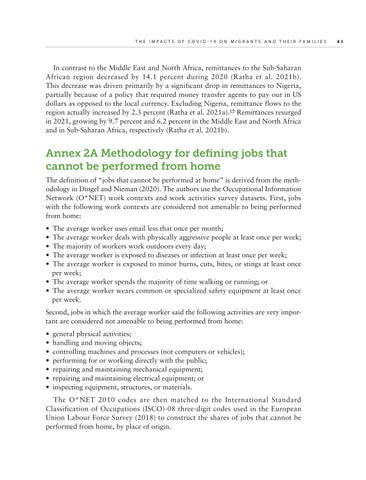Th e I m pac t s o f C OVID - 1 9 o n M i g r a n t s a n d Th e i r F a m i l i e s
In contrast to the Middle East and North Africa, remittances to the Sub-Saharan African region decreased by 14.1 percent during 2020 (Ratha et al. 2021b). This decrease was driven primarily by a significant drop in remittances to Nigeria, partially because of a policy that required money transfer agents to pay out in US dollars as opposed to the local currency. Excluding Nigeria, remittance flows to the region actually increased by 2.3 percent (Ratha et al. 2021a).19 Remittances resurged in 2021, growing by 9.7 percent and 6.2 percent in the Middle East and North Africa and in Sub-Saharan Africa, respectively (Ratha et al. 2021b).
Annex 2A Methodology for defining jobs that cannot be performed from home The definition of “jobs that cannot be performed at home” is derived from the methodology in Dingel and Nieman (2020). The authors use the Occupational Information Network (O*NET) work contexts and work activities survey datasets. First, jobs with the following work contexts are considered not amenable to being performed from home: • • • • •
The average worker uses email less that once per month; The average worker deals with physically aggressive people at least once per week; The majority of workers work outdoors every day; The average worker is exposed to diseases or infection at least once per week; The average worker is exposed to minor burns, cuts, bites, or stings at least once per week; • The average worker spends the majority of time walking or running; or • The average worker wears common or specialized safety equipment at least once per week. Second, jobs in which the average worker said the following activities are very important are considered not amenable to being performed from home: • • • • • • •
general physical activities; handling and moving objects; controlling machines and processes (not computers or vehicles); performing for or working directly with the public; repairing and maintaining mechanical equipment; repairing and maintaining electrical equipment; or inspecting equipment, structures, or materials.
The O*NET 2010 codes are then matched to the International Standard Classification of Occupations (ISCO)-08 three-digit codes used in the European Union Labour Force Survey (2018) to construct the shares of jobs that cannot be performed from home, by place of origin.
8 3

